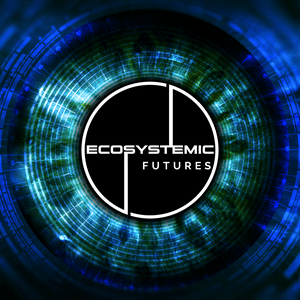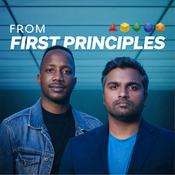133 episodes
- Strength in Systems: Setting Up America's Next 250 Years
Economists predicted collapse. Tariffs, protectionism, pandemic shocks - the global economy should have broken. It didn't. What we're witnessing isn't fragmentation. It's rebalancing. Nodes within the system - countries, industries - are reasserting their own interests after decades of subordination to global optimization. The network isn't breaking. It's healing.
Look at the conflicts that haven't escalated. Those that have resolved. Russia-Ukraine contained. No move on Taiwan. Venezuela intervention precise, limited, wildly successful. The Middle East hasn't exploded into a broader war. Economic and strategic geopolitical ecosystems are exerting stabilizing pressure that few expected possible. Trade flourishes despite biased rhetoric. This is emergent peacekeeping – thoughtful, strategic interconnection that raises the cost of conflict beyond what actors will pay.
Season 7 launches as America marks its 250th anniversary. The question: can we design ecosystems robust enough to deliver peace through strength, resilient enough to withstand disruption, and valuable enough to maintain cohesion? Six seasons and 118 episodes revealed the pattern: the future belongs
to orchestrated ecosystems, not heroic platforms. Season 7 asks the questions that define the next 250 years.
Paradigm Shifts:
📌 Protectionism as Rebalancing: Not system failure - system adaptation. Nodes reasserting interests within the network. Harmony requires balance, not subordination.
📌 Emergent Peacekeeping: Economic ecosystems exerting stabilizing pressure nobody designed. Trade continues despite rhetoric. Interconnection raises the cost of conflict.
📌 Efficiency Broke, Resilience Held: We measured efficiency for decades. Should have measured resilience. Ecosystems absorbed shocks that linear models couldn't predict.
📌 Infrastructure Redefined: Information flow, trust, education, incentive alignment - these are infrastructure now. Government's role: ecosystem orchestrator, not just regulator.
Critical Questions for Season 7:
📌 Can ecosystems be designed for peace through strength - or do they only emerge organically?
📌 How do we rebuild trust when science, institutions, and society have diverged?
📌 Are we bringing old paradigms to new frontiers - or can we start fresh in space, AI, and quantum?
📌 Distributed systems build resilience. AI investment concentrates in monopolies. How do we reconcile?
Strategic Reframe:
The global system isn't fragmenting - it's rebalancing, strengthening at the level of individual nodes.
Ecosystems are stabilizing conflicts nobody expected them to contain. The next 250 years will be defined not by platforms but by systems that learn, adapt, and hold under pressure. As DARPA taught us: imagine it, then drag it into the present. Season 7 begins.
Hosts:
Dyan Finkhousen, Founder & CEO, Shoshin Works
Marco Annunziata, Co-Founder, Annunziata Desai Partners
Vikram Shyam, Vik Strategic Solutions
Ecosystemic Futures is the Shoshin Works foresight series with NASA heritage. - Disease accelerates years in a month. Cancer cells reveal which patients might be most impacted by metastasis - a diagnosis invisible on Earth. Single crystals heal themselves through mechanisms we can't explain. These aren't projections. They're validated results from 2022-2025 that made 40-year NASA veterans say they'd never seen anything like it.
The economics flipped. Merck flew Keytruda 30 days, discovered a crystal form missed in a decade of labs - $20B/year by 2030, exceeding SpaceX's entire revenue.
The thesis: Two paths to space affordability: cut launch costs 10x AND multiply payload value 1,000x. Do what Earth cannot do at any price.
Paradigm Shifts:
📌Disease Years in a Month: Microgravity accelerates disease maturation, revealing mechanisms invisible on Earth. Drug development timelines collapse.
📌Stillness as Diagnostic: Space is profoundly still. Cancer cells that migrated in that stillness predicted metastatic death. NIH said: get us 100 samples.
📌Crystals That Heal: Single-crystal materials anneal in microgravity - healing defects not seen at 1G. Unexplained physics. Defense and quantum implications.
📌Transit as Factory Floor: LEO-to-Moon transit offers orders-of-magnitude better gravity. Artemis isn't exploration - it's industrial infrastructure.
Validated Results:
📌Crystals: 500+ studied since 1973. 80%+ improved dramatically. First flights, first hardware. Complexity didn't matter.
📌Semiconductors: 5% yield Earth → 90% space. NIST-validated. 5% of that quality would have been a win.
📌ZBLAN Fiber: 7+ miles in 16 days. 5x better than ground. Commercial scale achieved 2024.
📌Retinas: LambdaVision targeted 50 layers. Achieved 200. Clinical trials for blindness.
Strategic Reframe:
The physics are real. Results validated by NIST, NIH, and independent third parties. 2024 blockbuster; 2025 better; 2026 better still. Tens → hundreds → thousands: scaling logic is clear. Nations mastering space manufacturing gain a decisive advantage in industries defining 21st-century power. The window is now.
Guests: Lynn Harper, ISS National Lab & NASA InSPA | Dan Rasky, PICA Co-inventor & NASA Space Portal
Host: Dyan Finkhousen, Founder & CEO, Shoshin Works
Ecosystemic Futures is the Shoshin Works foresight series with NASA heritage. - The Gulf as One System: Bahrain's Aerospace Ecosystem
Many organizations get too big to succeed. Bahrain is small enough to call the minister and align an ecosystem over coffee. That's not a limitation—it's infrastructure. Leena Faraj spent a decade proving that relationship density beats bureaucratic scale. One island. Neighbors who outspend you ten to one. The puzzle: how do you win when you can't win the resource game? The answer: don't fight for the whole trip—win the increment. For some, Bahrain may not be big enough for two-week stays. But "pop in for a couple of days" works when the Gulf operates as one system. Regional partnerships turn constraints into market expansion.
The method: incubate what government can't control, prove it works, and hand it back. Tamkeen for SMEs. Mumtalakat—the sovereign fund whose subsidiaries now include McLaren. Airport operations are separated from the regulator. Ten years of lobbying later: Bahrain's first National Aviation Strategy.
Paradigm Shifts:
📌 Too Big to Succeed: Giants have resources. Small nations have relationship density. Boardrooms ratify what coffee conversations already decided. Informal alignment is infrastructure.
📌 Incubate → Prove → Hand Back: Strategic incubation isn't empire-building. Build entities that demonstrate the model, then reintegrate. Success is measured by handoff, not headcount.
📌 Win the Increment: Can't capture the whole market? Capture the margin. Micro-stays, seamless visas, regional coordination. Partnership expands the pie; rivalry fights over crumbs.
📌 If It Were Your Money: One question transforms ecosystem accountability. Subsidies create dependency. Investor mindset builds muscle.
Operational Impact:
📌 Plans Are Hypotheses: Paper lies, ground reveals. "The plan is not a Bible." Implementation challenges often turn out to be opportunities paper couldn't predict.
📌 Private Sector → Ministry: Bahrain rotates private sector leaders into government. They know what went wrong. Execution DNA cross-pollinates.
📌 Common Sense Isn't Common: The gap between what's obvious and what organizations do—that's where orchestrators create value.
📌 Failure as Curriculum: "Failure is part of your learning journey." Build tolerance into entrepreneurial development. Muscle grows under load.
Strategic Reframe:
Constraints aren't obstacles to strategy—they are the strategy. Forced niche clarity enables differentiation that giants can't match. As organizations scale, those who preserve informal alignment out-execute those who rely solely on governance. The future belongs to ecosystems small enough to align and networked enough to compound.
Guest: Leena Faraj, Head of Strategy, Bahrain Airport Company | Vice Chair, ACI Economic Committee
Host: Dyan Finkhousen, Founder & CEO, Shoshin Works
Series Hosts:
Dyan Finkhousen, Founder & CEO, Shoshin Works
Vikram Shyam, Futurist, NASA
Ecosystemic Futures is the Shoshin Works foresight series with NASA heritage. - The 'D' Got Deleted: How VC Funding Broke the Innovation Ecosystem
Last week's whitepaper isn't production-ready. But someone's already pitching it to your board. Kence Anderson has deployed 100+ autonomous AI systems for Fortune 500 companies—and watched venture capital create a research-to-PR pipeline that skips development entirely. The 'D' in R&D got deleted. Hype cycles got amplified.
Rule-based AI—systems encoding expertise as decision logic—was the 1980s breakthrough. Overhyped, then abandoned when it couldn't do everything. But engineers kept deploying it where codified rules excel: industrial controls, diagnostics, compliance. It's running critical infrastructure today. Every AI wave follows this arc. For leaders, the lesson: stop asking which technology wins. Ask what each does well—and build modular systems that match capabilities to tasks.
The fix: if AI can learn, someone should teach it the right way. Machine teaching—goals, scenarios, strategies—creates modular agents that compound capability through orchestration.
Paradigm Shifts:
📌 Components > Algorithms: LLMs excel at language. Reinforcement learning excels at practice. Engineering matches superpowers to tasks.
📌 Methodology Before Platform: Databases required relational algebra before SQL scaled. Autonomous AI requires machine teaching before platforms compound.
📌 Teaching > Training: Every intelligence requires instruction. Practice without pedagogy is noise.
📌 Swarms Beat Battleships: In an AI naval competition, one giant ship won—then got banned. The algorithm responded with 100,000 tiny ships and overwhelmed everyone. Distributed beats concentrated. Shopify vs. Amazon.
📌 Distributed but Interoperable: Winning economies build decentralized, self-healing innovation units. Losing economies calcify around monoliths.
Operational Impact:
📌 Research-to-PR Pipeline: When government labs led innovation, development preceded deployment. VC filled the gap but deleted the rigor.
📌 Hierarchical Orchestration: Supervisor agents directing specialized agents produce explainability swarms can't. Top-down orchestration enables traceability.
📌 Human-AI Teaming: Teams of agents and humans beat both alone. Experts teach agents; agents teach novices. Capability compounds bidirectionally.
📌 Space Forces the Issue: Harsh environments demand self-healing, modular systems. Manufacturing principles translate to orbital operations.
Strategic Reframe:
What's the superpower of each component? How do modular pieces orchestrate into systems that perform? Restore the 'D.' Ecosystems that develop escape the trough. Hype machines fall in.
Guest: Kence Anderson, CEO & Founder, AMESA | Author, Designing Autonomous AI
Series Hosts: Dyan Finkhousen, Founder & CEO, Shoshin Works | Vikram Shyam, Futurist, NASA
Ecosystemic Futures is the Shoshin Works foresight series with NASA heritage. - Stack or Stall: Why Credentials Collapse but Ecosystems Compound
Last year's Chemistry Nobel went to non-chemists. The lasting power of domain-specific credentials is collapsing - but David Julian has seen this pattern before across four technological revolutions and knows what compounds instead. From Hotjobs.com to Google's global EdTech partnerships, Julian identified what separates transformative innovations from footnotes: they teach users something new, reduce friction, and fundamentally improve lives. Now on Harvard's Galileo Project steering committee, he's applying ecosystem logic to AI-powered astrophysics - and discovering why stacking beats selecting.
The insight: Skills stack. Modular, complementary, and interoperable capabilities stack. Liberal arts + AI certifications compound income dramatically. Universities aren't obsolete - their business models are. Survivors become platforms for compounding, not gatekeepers of credentials.
Paradigm Shifts:
📌 Stack, Don't Select: Psychology degree + data analytics certification = dramatically higher median income. Critical thinking + immediate employability. Ecosystems reward combination, not specialization.
📌Outcomes > Access: Measure completion, not enrollment.
📌Curiosity Compounds: Space, science, and AI unify across divisions. Galileo Project inspires regardless of conclusions - serious anomaly inquiry advances physics, materials, and propulsion.
📌Revolution Patterns: Search democratized information. Smartphones democratized computing. Social democratized community. AI democratizes research-grade analysis. Each wave rewired ecosystems.
Operational Impact:
📌 Pre-K to Gray: EdTech isn't digitizing classrooms - it's lifelong capability building across universities, companies, and workforce organizations.
📌Global Context: Limited broadband markets require light apps. Infrastructure constraints determine adoption - not features.
📌Ecosystem Leverage: App stores became digital malls. Platforms that enable third-party value to outlast those that hoard capabilities.
📌Validation Gap: AI democratized skills, not credentialing. Universities still provide third-party validation that employers trust, but that trust is eroding. Whoever solves verification at scale wins.
Strategic Reframe:
Today's AI gold rush mirrors the dot-com era: everyone senses transformation, few recognize patterns. Then, as now, credentials collapse when they can't compound. Ecosystems compound when they enable stacking. The question: are you building stackable value into interconnected networks, or hoarding static credentials in isolated silos?
Guest: David Julian, Former Head of Industry, EdTech, Google | Steering Committee, Harvard Galileo Project
Host: Dyan Finkhousen, Founder & CEO, Shoshin Works
Series Hosts:
Vikram Shyam, Founder, Vik Strategic Solutions
Dyan Finkhousen, Founder & CEO, Shoshin Works
Ecosystemic Futures is the Shoshin Works foresight series with NASA heritage.
More Science podcasts
Trending Science podcasts
About Ecosystemic Futures
Ecosystemic Futures engages with the world’s elite thought leaders who are researching and leading meaningful development in areas that could impact society in the next half century.
Provided by Shoshin Works in collaboration with NASA Convergent Aeronautics Solutions Project - Ecosystemic Futures explores technological advances and structural patterns that will help us better innovate, operate, and navigate in our increasingly connected world.
Join the conversation as NASA leaders, and industry and policy luminaries share their perspectives with host Dyan Finkhousen, a leading strategist and global authority on ecosystemic solutions, and brilliant co-hosts.
Podcast websiteListen to Ecosystemic Futures, Blurry Creatures and many other podcasts from around the world with the radio.net app

Get the free radio.net app
- Stations and podcasts to bookmark
- Stream via Wi-Fi or Bluetooth
- Supports Carplay & Android Auto
- Many other app features
Get the free radio.net app
- Stations and podcasts to bookmark
- Stream via Wi-Fi or Bluetooth
- Supports Carplay & Android Auto
- Many other app features


Ecosystemic Futures
Scan code,
download the app,
start listening.
download the app,
start listening.



















![Podcast Cosmosis [Formerly The UFO Rabbit Hole]](https://www.radio.net/podcast-images/175/the-ufo-rabbit-hole-podcast.jpeg?version=c4cfeed14331265219e0263fd62be755644a8cf4)





















